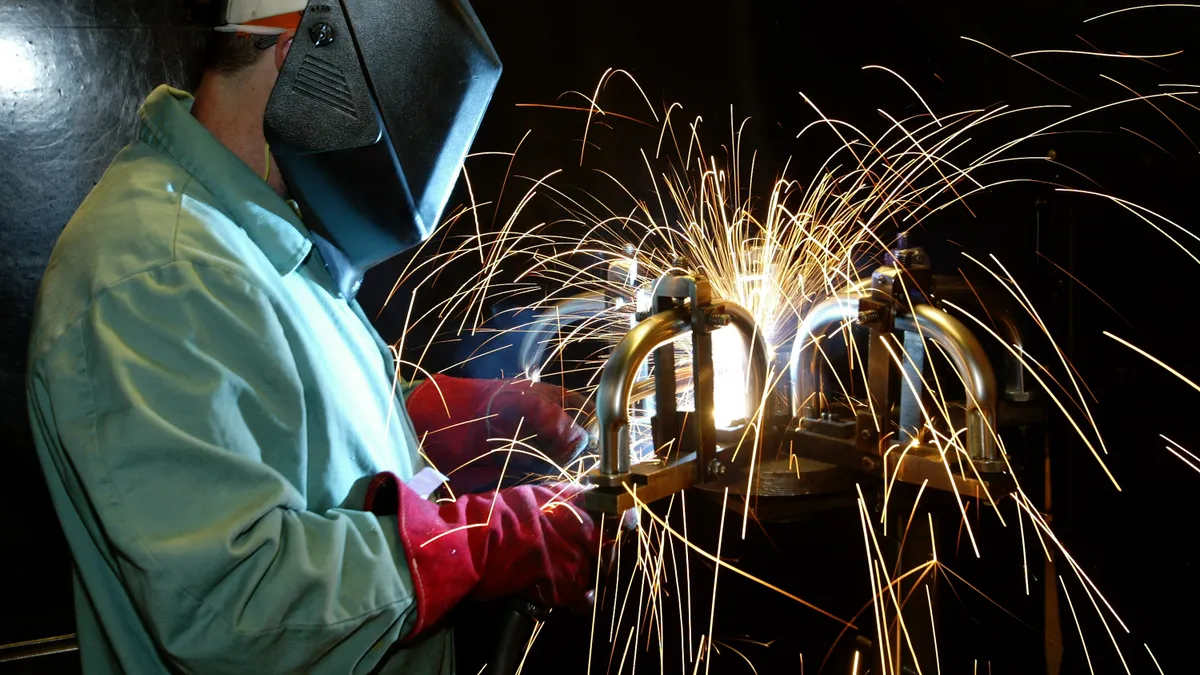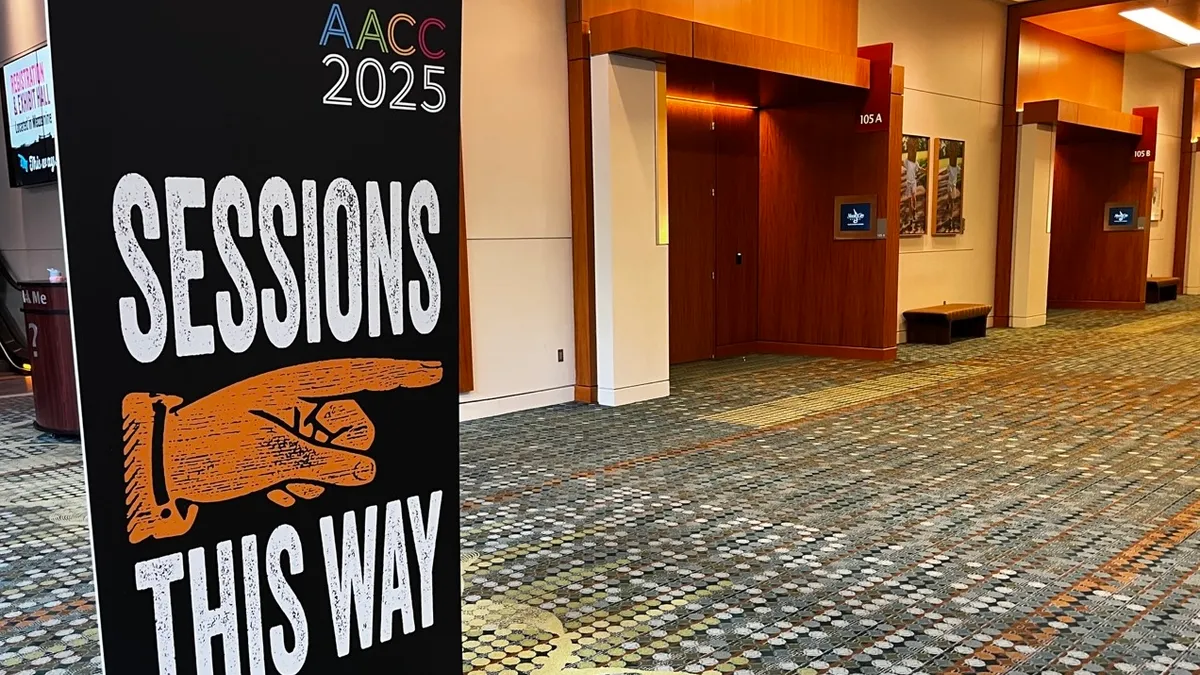When Florida residents who lost their jobs or had their hours reduced due to the pandemic were looking to retrain for new employment last fall, Valencia College sprung into action. The community college, based in Orlando, partnered with a local workforce organization to offer accelerated training in a range of fields at the Orange County Convention Center.
Orange County used money from the Coronavirus Aid, Relief and Economic Security Act to fund the program. Although the pop-up site was new, Valencia is well-versed in conducting short-term training programs across the region.
The college runs four sites, called Centers for Accelerated Training, that combine classrooms and hands-on lab space. They offer four- to 18-week training programs that lead to industry certifications in areas such as logistics, construction and welding. "We try to only put programs in place that address the talent needs of employers in critical industries," said Carol Traynor, Valencia's senior director of public relations.
Such programs also bring training closer to where students are. "It removes transportation as a major barrier to education," Traynor said. The college rotates certain programs through locations to increase students' access to them. Valencia considers proximity to public transportation, the absence of alternative training options and local demographics when deciding where to locate a center.
Valencia is one of several community colleges across the country that is rethinking how education is delivered by bringing hands-on training to students at remote and underserved locations. College officials say this method expands higher ed access and helps students gain industry-recognized certifications and better wages.
"Students who often are in (career and technical) programs are disproportionately adults working in some capacity who are facing these time and location constraints," said Justin Ortagus, a higher education professor at the University of Florida. "Especially if they are rural students or an education desert, this type of approach can make a lot of sense."
Ortagus sees parallels between bringing hands-on education directly to students and developing infrastructure for online education. While both types of programs might be expensive to launch, they can be an important way to increase access to training in high-demand professions.
Bringing hands-on experience to students
Valencia launched the first of its four Centers for Accelerated Training in 2016 with the help of a grant from the U.S. Department of Labor. The centers house short-term programs meant to "provide enough hands-on experience that employers would hire those students without significant industry experience," said Joe Battista, Valencia's vice president of global, professional and continuing education.
Lynn Garcia recently completed a 10-week program at Valencia that trained her to become an apartment maintenance technician. "Especially with this field, you have to have hands-on experience to actually understand what you're reading and seeing and doing, because some things aren't exactly like they are in the books," Garcia said.
According to Traynor, 95% of students enrolled at Valencia's training centers complete their program, and 81% are placed in a career in their field within three months.
Although federal financial aid can't be applied to the short-term programs, the college's foundation and nonprofit partners often provide grants to students. The centers target people who are under- or unemployed. "In central Florida, we have a lot of people who have been laid off from hospitality careers, and they're looking to transition to something new," she said.
"Especially if they are rural students or an education desert, this type of approach can make a lot of sense."

Justin Ortagus
Higher ed professor, University of Florida
Meanwhile, in Maine, one community college is hoping to help students in rural parts of the state's northern region earn college credentials.
Eastern Maine Community College, in Bangor, helps run an outreach center in the Katahdin region and has a second one in Piscataquis County. The centers allow people in communities away from the main campus to take classes closer to home.
The two sites run a two-year nursing program in partnership with local hospitals to help them recruit and retain nursing staff. "Hospitals in the rural parts of the state really struggle to attract a workforce," said Debora Rountree, associate academic dean at Eastern Maine.
The hospital in Piscataquis County pays one of its senior nurses to work as a clinical instructor, while the college uses a $60,000 state labor department grant to help offset the costs for the Katahdin region hospital's instructor.
The programs target people who might not have gone to college right after high school or who are place bound because of family or work commitments, Rountree said.
Eastern Maine just graduated its first group of 12 nursing students, all of whom are now working in the field, Rountree said.
Looking to partners
Some community colleges are partnering with four-year institutions to bring hands-on education to their students. In fall of 2019, Michigan State University's Institute of Agricultural Technology debuted a mobile food processing lab that it will be able to bring to a handful of community college partners around the state.
While students weren't able to use the lab during the pandemic, college officials hope that will change next fall.
Regional employers told Michigan State they need food processing employees with training beyond high school, said Jeffrey Swada, director of the university's undergraduate food science program. They also want workers with supervisory experience or who know how to fix broken equipment.
But most community colleges don't have laboratories with processing equipment, Swada said. Michigan State's solution was the traveling processing lab. This lets students take their prerequisite courses in math and science at the community colleges, while the university provides hands-on training about food processing technology and safety, Swada said.
"It's really in the best interest of the community and in the best interests of the students that we serve, to look at a different model that is going to be a win-win for employers and for the community."

Debora Rountree
Associate academic dean, Eastern Maine Community College
Students working in the lab can earn a two-year certificate in food processing, technology and safety from Michigan State's agricultural technology department and an associate degree from their community college.
The customized trailer cost around $1.2 million, Swada said, which an external grant covered. It includes equipment that can be swapped out for various kinds of processing — such as juicing grapes, making applesauce or peeling potatoes — allowing the trailer to be used in different parts of the state.
"The trailer itself has all the utilities and functionality that a large food processing plant would have but in miniature," Swada said.
Can these programs grow?
One of the challenges of hands-on education is that it can be difficult to scale, with most of these programs only able to serve 10 to 20 students at a time.
For nursing programs, it can be difficult to expand capacity while maintaining the low student-to-faculty ratios accreditors require, Rountree said. And at Michigan State, the mobile trailers can only accommodate a few students at a time.
But college officials say the success of these programs is encouraging them to expand. Valencia is planning to open a 26,400-square-foot facility — its largest yet — in Orange County this August, with the goal of increasing the number of students from around 100 to 900 across all the centers. Michigan State officials hope to take additional trailers to more community college partners, with some mobile units specializing in areas such as meat and dairy processing.
Rountree said it is mutually beneficial for colleges to figure out creative ways to bring hands-on education to students — wherever they are. "It's really in the best interest of the community and in the best interests of the students that we serve, to look at a different model that is going to be a win-win for employers and for the community."





















